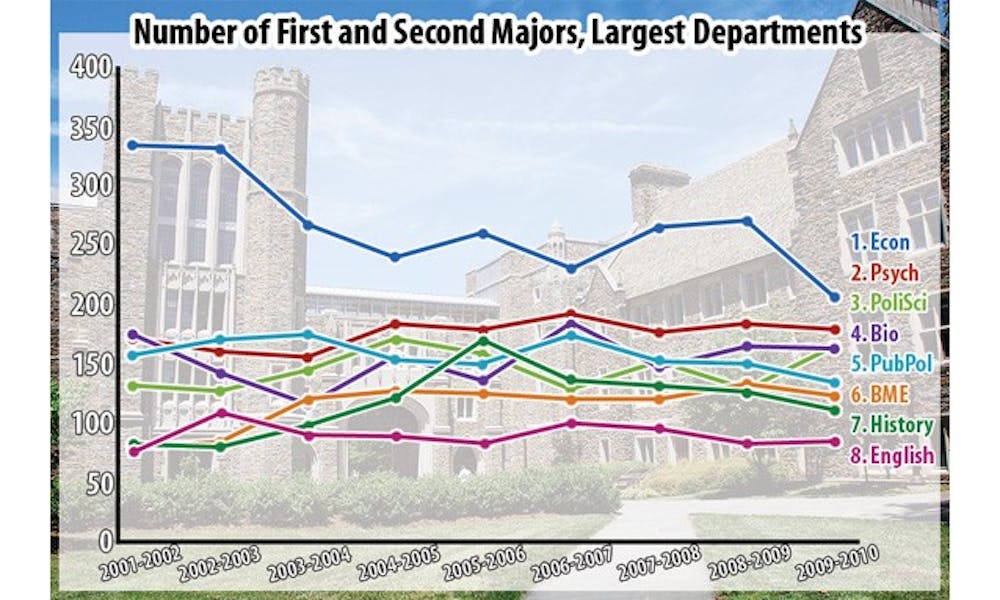Economics remains the most popular major at Duke, but the number of majors has decreased significantly since 2001-2002.
During the last academic year, 207 students graduated from the economics department, compared to 335 in 2001-2002, according to data compiled by David Jamieson-Drake, director of the Office of Institutional Research. In decreasing order, the eight departments with the most majors are economics, psychology, political science, biology, public policy studies, biomedical engineering, history and English.
For the purposes of comparison, Jamieson-Drake adjusted the data to account for the fluctuating number of graduates each year. He added that the most recent figures are still preliminary.
Over the past decade, the number of economics majors has fluctuated, but the major has remained the most popular. Connel Fullenkamp, director of undergraduate studies for economics, said he believes that there are several reasons why economics has remained a desirable major over time.
“Despite whatever the economy does, economics majors do well in the job market,” Fullenkamp said. “Even in a really down year like we had a couple of years ago, economics majors still found arguably really good jobs. Also, the popularity of economics is a phenomenon at every liberal arts school where there aren’t business majors.”
Fullenkamp said he has noticed that the recent economic downturn has affected what students are interested in within the field.
“More students are interested in analyzing how everything blew up in our faces a few years ago, and there’s more interest in some of the aspects of economics that were behind the scenes before,” he said.
The large size of the economics department sometimes makes it difficult for students to enroll in their desired elective classes, but Fullenkamp said that in general the economics department works hard to accommodate all students interested in the subject.
“We get complaints about our introductory classes being too big every semester, but we try to be responsive to those comments by putting our best instructors in our core courses,” Fullenkamp said. “We have a standing policy that we’ll expand any of our core classes to acquire any student. For electives, we generally can accommodate everyone, but not everyone can get their first choice.”
Accommodating all students in core courses comes at the expense of course size, however. This semester, the five core economics classes required for all majors—Econ 51, 55D, 105D, 110D and 139D—contain 245, 232, 79, 73 and 129 students, respectively.
Steve Nowicki, dean and vice provost for undergraduate education, said the number of majors in a department only indirectly affects the amount of funding it gets.
“I would say that at Duke or at comparable places, departments don’t rise and fall based on the number of students,” Nowicki said. “But that isn’t to say that if a department got a huge number of majors, that the dean of the school wouldn’t help that department.”
Nowicki also noted that there is not a simple formula for determining the number of seats offered in each class.
“There is lots of discussion between directors of undergraduate studies, and we work on a dynamic basis to figure out how to create more seats,” Nowicki said.
Other large departments come across similar issues with accommodating students for introductory courses, including the Sanford School of Public Policy. Ken Rogerson, director of undergraduate studies for public policy, said several factors affect the number of seats offered for a particular course in the department.
“The number of openings in a course is based on the substance of the course, the availability and work load of teaching assistants and the available space,” Rogerson said. “For the core courses, each year we offer the number of openings that is at least 20 percent more than the average graduating class size. Every core course is offered every semester.”
A relatively new major, public policy class size has not fluctuated significantly over the past 10 years. However, public policy is still a very popular major and sometimes students have trouble enrolling in the large introductory classes.
“We are fortunate to have been able to hire more faculty over the past few years to teach and work with the students,” Rogerson said. “That has helped expand the number and type of electives we were able to offer and has given us a strong faculty to teach the core courses.”
Get The Chronicle straight to your inbox
Signup for our weekly newsletter. Cancel at any time.

